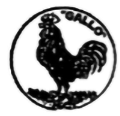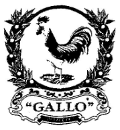
A marca de azeites portugueses GALLO aproveitou a proximidade da Páscoa e anunciou uma modificação na forma de apresentação da marca e do rótulo de seus produtos.
Segundo o diretor de marketing da empresa, Pedro Gonçalves, a nova identidade visual foi inspirada em uma lenda sobre a origem da marca. Ele relata que em 1919, o fundador da empresa Victor Guedes acordou e ao abrir a janela ouviu um galo cantar com a vista dos olivais e o sol da alvorada. Assim, o galo e o sol fazem parte da história da marca, sendo que, com o passar do tempo, o sol foi perdendo seu protagonismo na logo. Desta forma, com a nova remodelagem, a empresa buscou resgatá-lo de forma contemporânea.
A marca se encontra registrada no Brasil pelo menos desde 1971, com sua apresentação mista, à época, um galo, envolto por um círculo:

No decorrer dos anos, a marca sofreu diversas modificações até chegar na apresentação atual e a empresa, sempre se preocupou em proteger a logo atualizada – apresentação mista (logo + imagem) através de novos pedidos de registro perante o INPI:
| 1961 | 2001 | 2017 | 2022 | 2024 |
 |  |  |  |  |
Mas… E se a empresa não tivesse agido desta forma? Se apenas mantivesse a marca original de 1961 e fosse atualizando seu logo, sem pedir o registro de suas novas identidades, o que poderia ter acontecido?
A resposta é simples: a empresa poderia ter perdido seu direito sobre a marca através de um pedido de caducidade solicitado por terceiro, ou seja, perderia o registro por não utilizar a marca tal qual ela foi concedida.
Desta forma, se verifica, no caso concreto, a importância da proteção da marca e mais que isso, de manter o registro sempre atualizado de acordo com a forma que venha sendo utilizada.